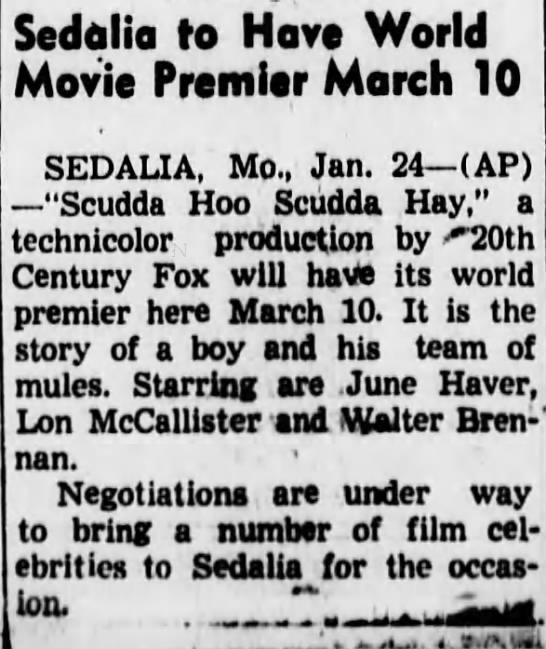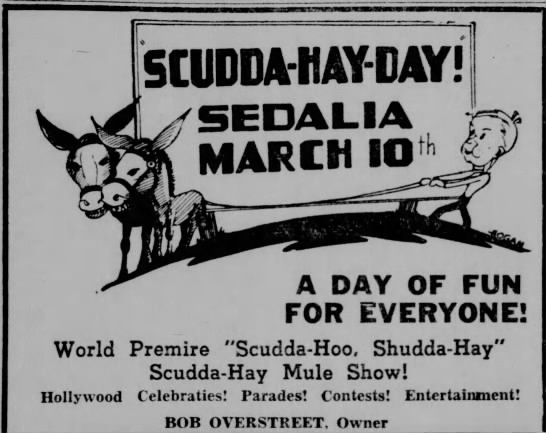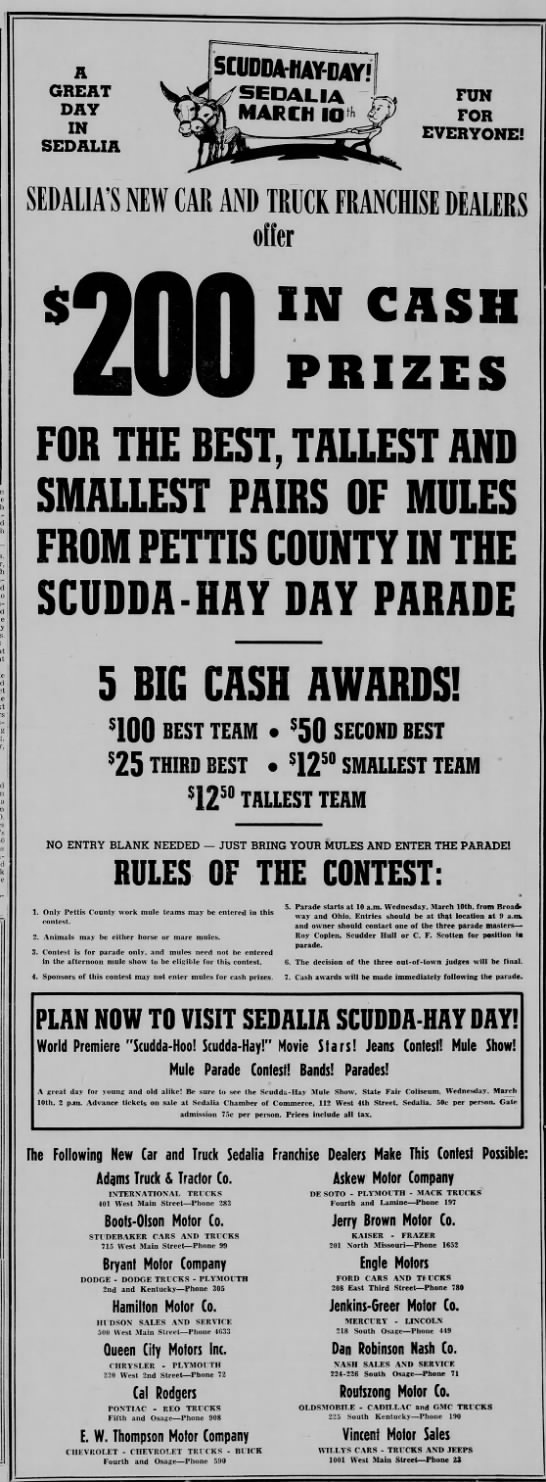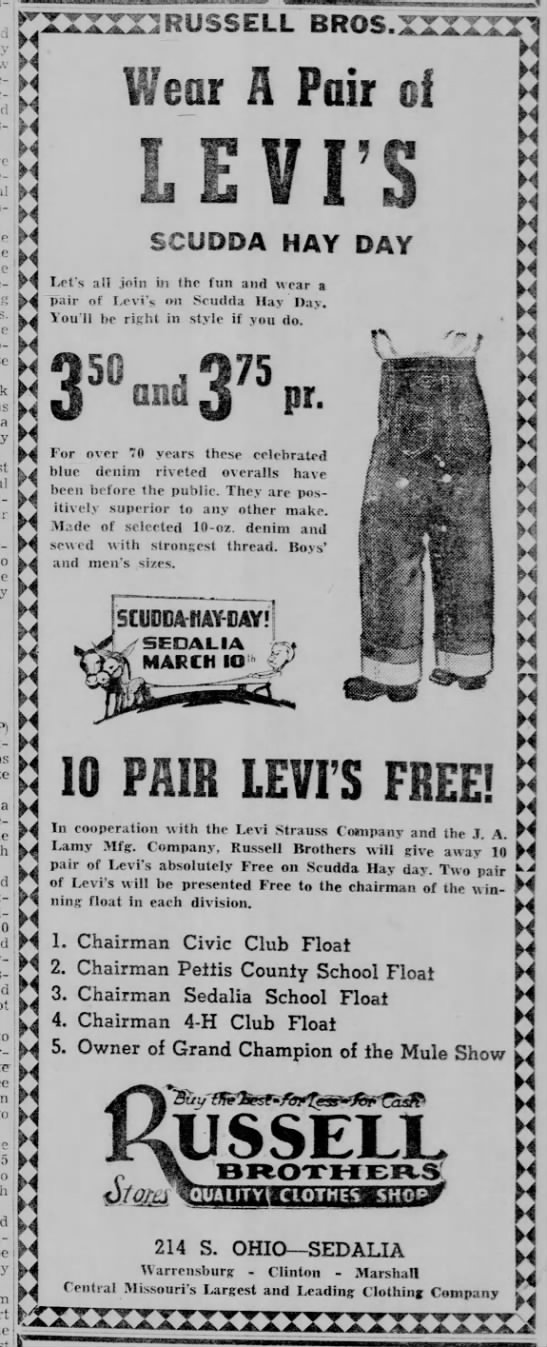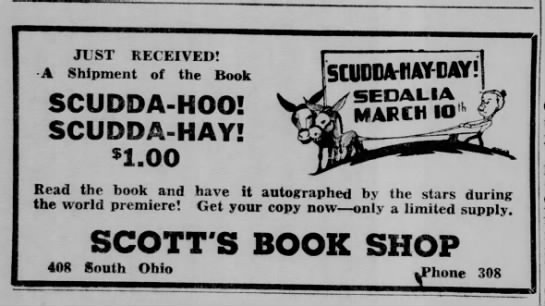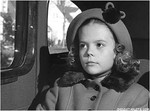March 10, 1948 World Movie Premiere Sedalia, Missouri
World Premiere in Sedalia, MO. March 10, 1948. Then the movie opened at 392 other Midwest Screens. Sedalia held a parade, contests, events with over 3200 people attending the premiere shows in Sedalia.
 |
| Natalie Wood and Marilyn Monroe (Blue Dress) Appear together the only time in their careers. 1948. This was Natalie's 7th Film! |
 |
| Marilyn Monroe's First On Screen Line in any movie. 1948. She said, "Hi, Rad.! Youtube Link  |
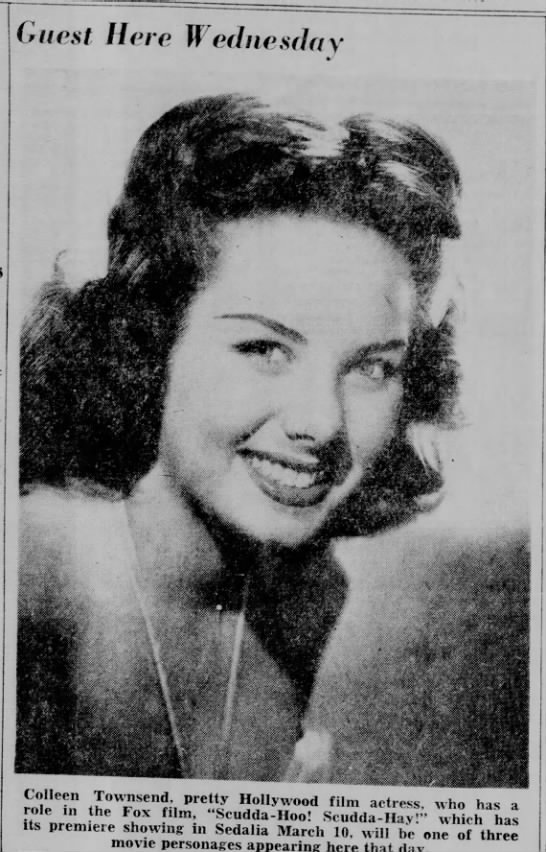 |
| Colleen Townsend Attends Sedalia, MO Premiere Colleen_Townsend (Evans) Link Worked with the Billy Graham Crusades 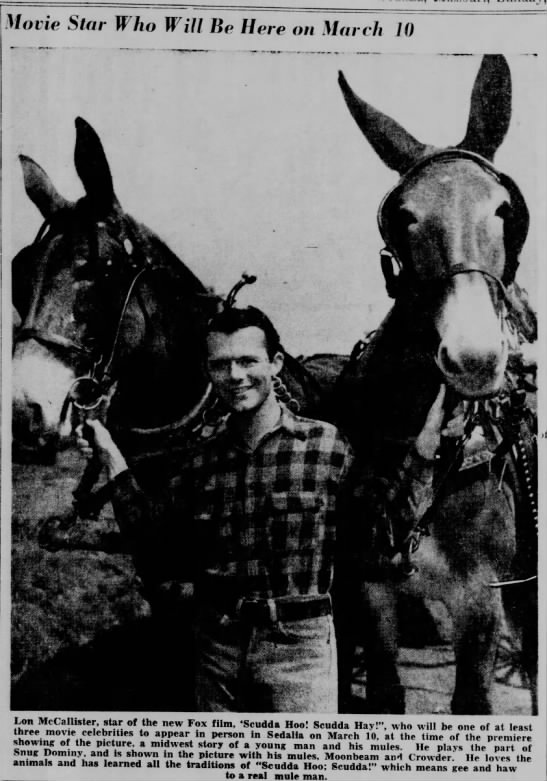 Lon McCallister came to Sedalia, March 10, 1948 September 1, 1948, Sedalia Democrat 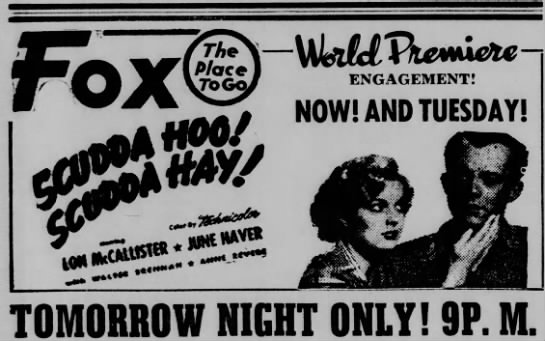 |
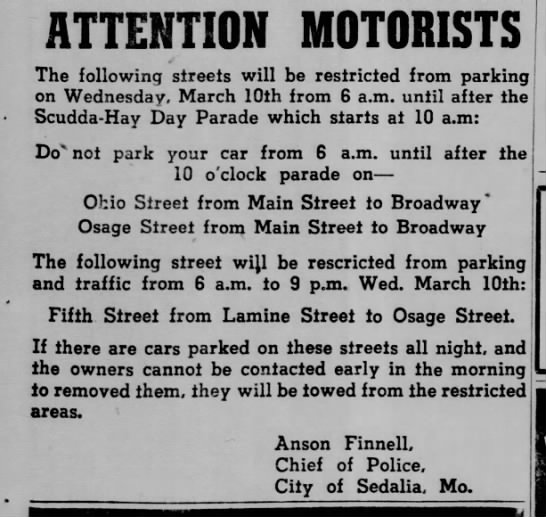
 |
| 3200 People Attended the World Premiere Movie Event in Sedalia, Mo |
 | ||
| Cast of Scudda-Hoo Scudda-Hay, Hollywood. 22 year old Marilyn Monroe in the middle.
|
In the spring of 1947, Marilyn was finally given her first speaking role -- a bit part in a musical comedy called Scudda Hoo! Scudda Hay! A bit role differs from extra work in that the actor gets at least one line as well as an acknowledgment of the appearance by the studio. Graduating from extra work to bit parts can be an important step in an actor's career -- many an aspiring star has been noticed by milking a bit into a memorable screen debut.
Marilyn's big scene featured her character, Betty, dressed in a pinafore and walking down the steps of a small-town church. Betty passes the main character, played by June Haver, and says, "Hi, Rad," to which Haver replies, "Hi, Betty."
Hardly earth-shattering material, but Marilyn was supposed to get at least one close-up. After she became a star, the Twentieth Century-Fox publicity department circulated the story that her only line in this film had ended up on the cutting room floor. Marilyn herself repeated the anecdote in 1955, on Edward R. Murrow's television interview program, Person to Person.
However, according to film historian and noted Monroe buff James Haspiel, the story is not true. Haspiel maintains that Marilyn's brief line remains intact in complete versions of the now-obscure Scudda Hoo! Scudda Hay!, as does a shot of Marilyn and another starlet paddling a canoe. Neither shot appears in close-up, however, indicating that Marilyn's close-ups had been edited from the film.
Marilyn's part in this mediocre B-film -- remembered now only because of her appearance -- did little for her career, and it was several months before she got another bit role. In the meantime, she worked on her acting talents.
MARCH: 1947
Beginning of the shooting of "Scudda Hoo, Scudda Hey!", a movie shot in Technicolor under F.Hugh Herbert 's direction. The film related the story of a farmers familiy who quarreled about the best way to take care of jennies (the title of the movie alluded to the traditional scream used to goad the jennies harnesses). Marilyn embodied a student. She shot 2 scenes: in one of them, she was in a rowing boat with another starlet (scene cut during the film-editing). In the other one, where she furtively appeared on the screen, she was background and said hello to June Haver, the leading role.
Natalie Wood
"Scudda Hoo! Scudda Hay!" Is the rallying cry of the muleteer to his mules .
This is already the 7th film of the young Natalie Wood , born July 20, 1938.
Marilyn Monroe is not mentioned in the credits of Scudda Hoo! Scudda Hay! which should be actually regarded as the very first film she turned, although the was released after Dangerous Years (this last is released in theaters December 7, 1947). She plays a peasant woman who pronounces a "Hello June!" Which was cut to assembly. One can only perceive that briefly, descending the steps of a church steps, she addresses a "Hi Rad!" To actress June Haver. One can see her again in another scene, she is in a canoe with a friend, but only seen from afar on the lake.
Marilyn Monroe will again starred with actress June Haver in Love Nest (1951) and the actor Walter Brennan in A Ticket to Tomahawk (1950). Then she still run under the direction of director F. Hugh Herbert in Honey, get divorced (in 1951).

Scudda Hoo! Scudda Hay!
Directed by
F. Hugh Herbert
Produced by
Walter Morosco
Screenplay by
F. Hugh Herbert
Based on
Scudda Hoo! Scudda Hay!
by George Agnew Chamberlain
Starring
June Haver
Lon McCallister
Walter Brennan
Music by
Cyril Mockridge
Cinematography
Ernest Palmer
Edited by
Harmon Jones
Production
company
20th Century Fox
Distributed by
20th Century Fox
Release dates
March 11, 1948
Running time
95 minutes
Country
United States
Language
English
Budget
$2 million
Box office
$2 million (US rentals)
Scudda Hoo! Scudda Hay! is a 1948 American comedy film, written and directed by F. Hugh Herbert, starring June Haver, Lon McCallister and Walter Brennan. Released by 20th Century Fox, it is known for Marilyn Monroe's earliest speaking role, a one-line bit part.
The screenplay was adapted by the director F. Hugh Herbert from the novel of the same name by George Agnew Chamberlain
The film tells the story of two antagonistic stepbrothers living on a mid-western farm with their mother. One of them takes a job as a hired-hand with a neighboring farmer from whom he buys a pair of mules and must learn to train them, and whose daughter he is in love with, though she entices both brothers to compete for her affections.
Colleen Townsend is also featured in the movie, though not credited, playing a small role.
Plot
Farmer Milt Dominy (Henry Hull) and his son Daniel (Lon McCallister), who is called "Snug", commiserate with each other about their loathing of Judith (Anne Revere), Milt's second wife, and her brutish son Stretch (Robert Karnes). Milt decides to return to the sea while Snug takes a job as a hired hand with a neighboring farmer, Robert "Roarer" McGill (Tom Tully), with whose daughter, Rad (June Haver), he is in love, although the daughter gets her kicks out of keeping him guessing about her true feelings. Her father neither encourages nor endorses the courtship.
Some days later, Snug offers to buy two mules, named Crowder and Moonbeam, from his boss, to add to his income. Roarer agrees but warns Snug that ownership of the mules will revert to him if Snug misses even one payment. Snug then takes Crowder and Moonbeam to Tony (Walter Brennan)'s farm, and Tony, who was once a dedicated mule driver before falling down on his luck and becoming an alcoholic. While learning about the mules, Snug also deals with Judith and Stretch, who are trying to take over the Dominy farm.
Eager to help Snug, Tony introduces him to logging foreman Mike Malone (G. Pat Collins), who offers him a well-paying job, which will start when Snug learns how to drive the mules. Tony teaches Snug the commands "scudda hoo" and "scudda hay," which mean "gee" and "haw," country slang for "left" and "right".
One day, Snug's deliberate insolence prompts Roarer to fire him, and Snug goes to work at the lumber camp. Snug intends to use his first week's pay for another installment on the mules and is devastated when Tony, who was holding the money, returns home drunk and broke. Snug begs Roarer to accept a double payment in a few days, but Roarer refuses and asks Sheriff Tod Bursom to enforce his right to reclaim the mules. Seeing this, Roarer's wife Lucy finally stands up to her overbearing husband and loans the money.
Meanwhile, Snug learns that his father has died, leaving him the Dominy farm, and Tony promises to consult Judge Stillwell about evicting Stretch and Judith. Soon after, Stretch places a wire snare in Crowder and Moonbeam's stall in an attempt to cripple them. Snug and Rad, who are out on a date, return to Tony's house and there catch Stretch as Crowder is crushing him against the barn wall. Snug rescues Stretch from Crowder then throws him off Tony's property. Later, Judge Stillwell and Sheriff Bursom evict Stretch and his mother from the Dominy farm. As Snug, Rad and Tony are riding back to Tony's, they pass Roarer, whose tractor is stuck in the mud. Snug bets Roarer that if Moonbeam and Crowder can pull the tractor free, Roarer will forget Snug's debt, but if they fail, Roarer will resume possession of them. Snug also asks for Roarer's blessing of his marriage to Rad if he succeeds, and Roarer reluctantly agrees. Snug expertly drives the animals and soon the tractor is free. Finally, as a happy Rad joins Snug, Roarer concedes that at least the mules will still be in the family.
Cast
· June Haver as Rad McGill
· Lon McCallister as Daniel "Snug" Dominy
· Walter Brennan as Tony Maule
· Anne Revere as Judith Dominy
· Robert Karnes as Stretch Dominy
· Henry Hull as Milt Dominy
· Tom Tully as Robert McGill
· Natalie Wood as Eufraznee "Bean" McGill
· G. Pat Collins as Mike Malone (uncredited)
· Marilyn Monroe as Betty (Girl leaving Church Service greeting Rad) (uncredited)
· Colleen Townsend as Girl Leaving Church Service (uncredited)
Marilyn Monroe's participation
After having been signed to 20th Century Fox as a contract player, Marilyn Monroe had her first bit part playing Betty in this film. Dressed in a pinafore and walking down the steps of a church, she says, "Hi, Rad" to Haver's character, who responds, "Hi, Betty." After Monroe's stardom, 20th Century Fox began claiming that Monroe's only line in the film had been cut out, an anecdote Monroe repeated on Person to Person in 1955. But film historian James Haspiel says her line is intact, and she also appears in a shot with herself and another woman paddling a canoe.
In popular culture
In a scene from the 1989 motion picture Driving Miss Daisy, the movie theatre marquee in town indicates Scudda Hoo! Scudda Hay! is playing when Hoke drives Miss Daisy to the Piggly Wiggly grocery store.
Lon McCallister
Walter Brennan
Music by
Cyril Mockridge
Cinematography
Ernest Palmer
Edited by
Harmon Jones
Production
company
20th Century Fox
Distributed by
20th Century Fox
Release dates
March 11, 1948
Running time
95 minutes
Country
United States
Language
English
Budget
$2 million
Box office
$2 million (US rentals)
Scudda Hoo! Scudda Hay! is a 1948 American comedy film, written and directed by F. Hugh Herbert, starring June Haver, Lon McCallister and Walter Brennan. Released by 20th Century Fox, it is known for Marilyn Monroe's earliest speaking role, a one-line bit part.
The screenplay was adapted by the director F. Hugh Herbert from the novel of the same name by George Agnew Chamberlain
The film tells the story of two antagonistic stepbrothers living on a mid-western farm with their mother. One of them takes a job as a hired-hand with a neighboring farmer from whom he buys a pair of mules and must learn to train them, and whose daughter he is in love with, though she entices both brothers to compete for her affections.
Colleen Townsend is also featured in the movie, though not credited, playing a small role.
Plot
Farmer Milt Dominy (Henry Hull) and his son Daniel (Lon McCallister), who is called "Snug", commiserate with each other about their loathing of Judith (Anne Revere), Milt's second wife, and her brutish son Stretch (Robert Karnes). Milt decides to return to the sea while Snug takes a job as a hired hand with a neighboring farmer, Robert "Roarer" McGill (Tom Tully), with whose daughter, Rad (June Haver), he is in love, although the daughter gets her kicks out of keeping him guessing about her true feelings. Her father neither encourages nor endorses the courtship.
Some days later, Snug offers to buy two mules, named Crowder and Moonbeam, from his boss, to add to his income. Roarer agrees but warns Snug that ownership of the mules will revert to him if Snug misses even one payment. Snug then takes Crowder and Moonbeam to Tony (Walter Brennan)'s farm, and Tony, who was once a dedicated mule driver before falling down on his luck and becoming an alcoholic. While learning about the mules, Snug also deals with Judith and Stretch, who are trying to take over the Dominy farm.
Eager to help Snug, Tony introduces him to logging foreman Mike Malone (G. Pat Collins), who offers him a well-paying job, which will start when Snug learns how to drive the mules. Tony teaches Snug the commands "scudda hoo" and "scudda hay," which mean "gee" and "haw," country slang for "left" and "right".
One day, Snug's deliberate insolence prompts Roarer to fire him, and Snug goes to work at the lumber camp. Snug intends to use his first week's pay for another installment on the mules and is devastated when Tony, who was holding the money, returns home drunk and broke. Snug begs Roarer to accept a double payment in a few days, but Roarer refuses and asks Sheriff Tod Bursom to enforce his right to reclaim the mules. Seeing this, Roarer's wife Lucy finally stands up to her overbearing husband and loans the money.
Meanwhile, Snug learns that his father has died, leaving him the Dominy farm, and Tony promises to consult Judge Stillwell about evicting Stretch and Judith. Soon after, Stretch places a wire snare in Crowder and Moonbeam's stall in an attempt to cripple them. Snug and Rad, who are out on a date, return to Tony's house and there catch Stretch as Crowder is crushing him against the barn wall. Snug rescues Stretch from Crowder then throws him off Tony's property. Later, Judge Stillwell and Sheriff Bursom evict Stretch and his mother from the Dominy farm. As Snug, Rad and Tony are riding back to Tony's, they pass Roarer, whose tractor is stuck in the mud. Snug bets Roarer that if Moonbeam and Crowder can pull the tractor free, Roarer will forget Snug's debt, but if they fail, Roarer will resume possession of them. Snug also asks for Roarer's blessing of his marriage to Rad if he succeeds, and Roarer reluctantly agrees. Snug expertly drives the animals and soon the tractor is free. Finally, as a happy Rad joins Snug, Roarer concedes that at least the mules will still be in the family.
Cast
· June Haver as Rad McGill
· Lon McCallister as Daniel "Snug" Dominy
· Walter Brennan as Tony Maule
· Anne Revere as Judith Dominy
· Robert Karnes as Stretch Dominy
· Henry Hull as Milt Dominy
· Tom Tully as Robert McGill
· Natalie Wood as Eufraznee "Bean" McGill
· G. Pat Collins as Mike Malone (uncredited)
· Marilyn Monroe as Betty (Girl leaving Church Service greeting Rad) (uncredited)
· Colleen Townsend as Girl Leaving Church Service (uncredited)
Marilyn Monroe's participation
After having been signed to 20th Century Fox as a contract player, Marilyn Monroe had her first bit part playing Betty in this film. Dressed in a pinafore and walking down the steps of a church, she says, "Hi, Rad" to Haver's character, who responds, "Hi, Betty." After Monroe's stardom, 20th Century Fox began claiming that Monroe's only line in the film had been cut out, an anecdote Monroe repeated on Person to Person in 1955. But film historian James Haspiel says her line is intact, and she also appears in a shot with herself and another woman paddling a canoe.
In popular culture
In a scene from the 1989 motion picture Driving Miss Daisy, the movie theatre marquee in town indicates Scudda Hoo! Scudda Hay! is playing when Hoke drives Miss Daisy to the Piggly Wiggly grocery store.
Watch the full-length movie here
Scudda-Hoo Scudda-Hay
World Premiere March 10, 1948
Sedalia, Missouri
Col. Louis M. Monsees of Smithton, Pettis County, was considered to be the king of jackstock breeders in the United States. In March 1905, Mr. Monsees sold a number of jacks and jennets that averaged more than any other sale in the country at that time. At the St. Louis World’s Fair in 1904 the Monsees collection of jacks and jennets made a brilliant record. They won fourteen gold medals and diplomas. They also won the greatest amount of cash won that was won by any other exhibitor of livestock of any category. Mr. Monsees held the undisputed rank as the foremost breeder of jackstock in the country. Mr. Monsees achieved his great reputation as a constructive breeder through the use of two beautiful sires - Limestone Mammoth and Orphan Boy. Orphan Boy had a remarkable career as a show animal in the hands of Mr. Monsees. He was never defeated in the show-ring, and was also a great breeding jack on mares and jennets.
Monsees praised the merits of mules about 1917, predicting that "There are too many countries and places where the tractors or other motors cannot fill the place of the mule.... as the mule is the best of all working animals." He also wrote, "The mule is by far the best and cheapest to operate large farms with, especially sugar and cotton plantations, where horse power is used...... mules can be unharnessed when the day's work is over, turned in this corral or lot where there is a tank full of water, a trough full of grain and rack full of hay without any danger whatever of a mule over-eating or over-drinking himself, or of having colic or getting foundered, etc., and there is no danger of these mules kicking and hurting one another. The mule is too smart to over-drink or over-eat, or to be hurt by another mule."
Monsees' Limestone Valley Jacks, ca. 1903











